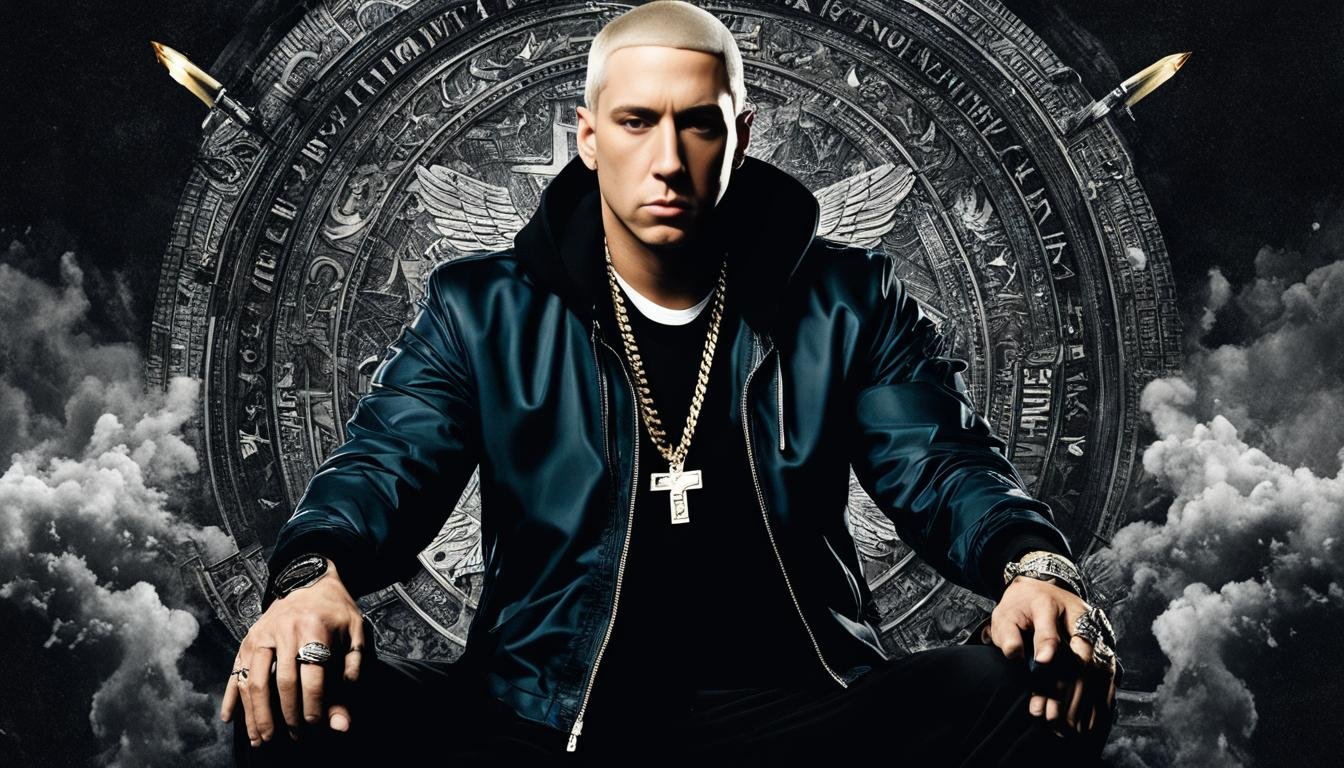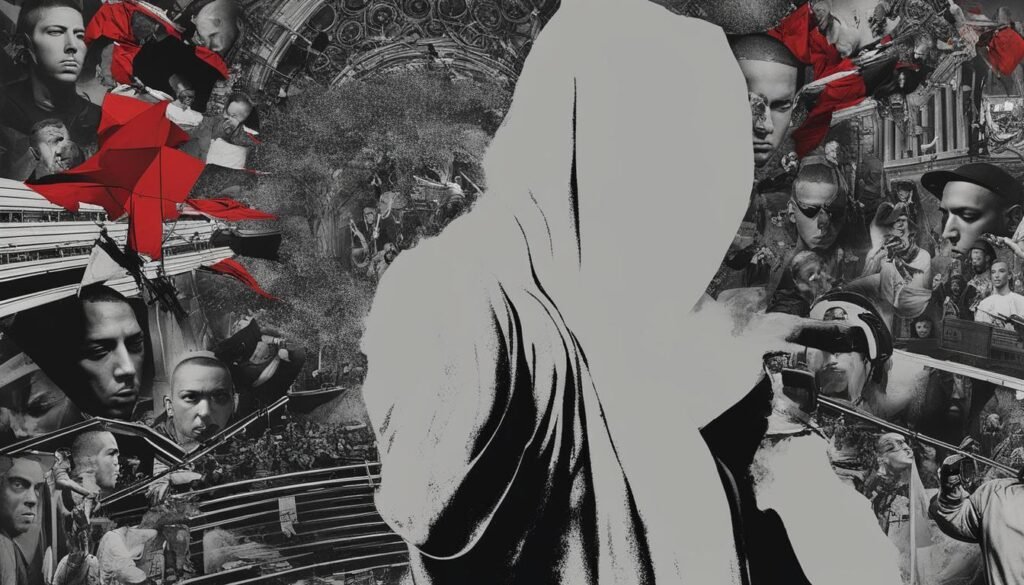Did Eminem Sell His Soul?

Have you ever found yourself tangled in the web of Eminem conspiracy theories, pondering whether the legendary artist made a Faustian bargain for his astronomical success? The query, “did Eminem sell his soul,” echoes through his self-aware lyrics and has become a staple of pop culture debates. It’s a metaphor that challenges the boundaries of an artist’s moral compass, pitting raw talent against the lustrous allure of fame and fortune.
Embark on a lyrical journey where Eminem’s spiritual beliefs become a canvas for his introspection and self-expression. You’ve heard the hits, you’ve seen the awards, but beneath the surface lies a provocative narrative wrestling with identity and integrity. Dive into the mind of Marshall Mathers, where each rhyme is a puzzle piece to understanding the enigma surrounding his rise to the pinnacle of the music industry.
Eminem’s Lyrics and the Notion of Selling One’s Soul
When you dive into Eminem’s body of work, you’re confronted with a recurring exploration of a chilling narrative: the concept of an artist trading their core values for fame and fortune. This theme of Eminem’s alleged pact with the devil isn’t just fodder for scandalous headlines—it’s a topic that he probes with finesse and depth. To truly understand the eminem soul-selling controversy, you must grapple with the sharp duality present in his words.
The track “Love The Way You Lie” stands as a testament to Eminem’s uncanny ability to tap into mainstream trends, evidencing a keen awareness of the mechanics behind crafting chart-topping hits. However, as you dissect his lyrics, you’ll notice an undercurrent of self-reflection, perhaps even regret. Has Eminem compromised his intricate lyricism to gain broader appeal and industry plaudits? It’s a question that resonates throughout eminem music industry deals, as discussions ripple across fan forums and critical think pieces alike.
Beyond the catchy hooks and hypnotic beats, Eminem has laid bare his inner turmoil. This is where his artistry truly shines—balancing commercial prowess with a relentless pursuit of lyrical excellence. As his verses cut deeper into the psyche of Marshall Mathers, we’re left to ponder the cost of global stardom on an artist’s soul.
The Eminem Soul-Selling Controversy Explored
As you dive deeper into Eminem’s career, you might have stumbled upon a storm of discussions centered around the notion of Eminem selling out. Rumors about Eminem’s devil worship and even making a satanic pact have spiced up tabloids and social media, leaving many fans questioning the integrity behind the lyrics of this rap icon.
Explaining “Selling Out” in the Music Industry
In the rap game, ‘selling out’ is a term that hits hard. It’s about artists ditching their roots for radio hits and Billboard charts, which some claim Eminem has done. Looking at tracks that top the charts not just for their beats but for their mainstream appeal, it can appear that artistic essence is sacrificed for lucrative deals and widespread recognition.
Artistic Integrity vs. Mainstream Success
It’s a tightrope walk for artists like Eminem – balance artistic integrity with mainstream success. For Marshall Mathers, his meteoric rise to stardom brought wealth and fame, but whispers of an eminem satanic pact suggest a quest for success that knows no moral bounds. Yet, analyzing his songs, you’ll find complexity and honesty, fingerprints of an artist who has wrestled but not necessarily surrendered to the music industry’s siren call.
Eminem’s Public Persona and Lyrical Content
Eminem’s public persona – the real Slim Shady – often blurts out bold, controversial lines that some interpret as evidences of a darker alliance. His lyrical content, while shockingly vivid, portrays characters that reflect bits of his personal struggles, further fueling the eminem devil worship conspiracy theories. Eminem himself plays with his image, to the extent that understanding where Marshall Mathers ends, and the provocateur begins becomes a challenge.

Did Eminem Sell His Soul?
You might have stumbled upon forums or social media threads filled with eminem illuminati rumors or various eminem conspiracy theories. It’s no secret that the rap mogul has been a subject of intense speculation over the years, with many critics sifting through his lyrics for any hint of a nefarious pact. But let’s set the record straight—these accusations are more of a testament to Eminem’s powerful storytelling ability and knack for stirring up the pot rather than any tangible connections to the Illuminati or satanic deals.
The truth is, when it comes to understanding the imagery and themes Eminem employs, context is king. His raw and unapologetic portrayal of personal and societal issues often clashes with the public’s search for sensationalism. Sure, he’s dabbled with controversial content, but doesn’t that come with the territory of pushing artistic boundaries? Eminem’s real genius lies in his skill to provoke thoughts and debates, not in any alleged backroom Illuminati handshakes.
So next time you hear someone whisper about Eminem’s supposed dark deals, you can bet that’s just another aspect of celebrity culture that relishes in myth-making and misunderstanding artistic expression. Eminem tells a story, and sometimes that story is deliberately shocking—but that’s just what artists do. They reflect, they exaggerate, and they entertain. And in Eminem’s case, he does it so convincingly that you might just believe he’s gotten away with selling his soul.
The Role of Fame and Fortune in Eminem’s Career
As you delve into the enigma that is Eminem, it becomes apparent that fame and fortune are not just external markers of his success, but integral elements that shape his art. The influence of his celebrity status is not a simple byproduct of his music; rather, it’s a conscious subject of introspection and critique in his body of work, weaving through his lyrics as both a blessing and a burden. At this point in Eminem’s journey, examining the intertwining of eminem spiritual beliefs and eminem music industry deals offers revealing insights into the complexity of his persona.
Embracing Celebrity in ‘The Marshall Mathers LP’
The release of ‘The Marshall Mathers LP’ not only catapulted Eminem to new heights of fame, but also marked the onset of a deeply personal conversation with his audience about the realities of life in the limelight. Far from simply basking in the glory, he painted a vivid picture of the challenges that come with being in the public eye. His words acted as sharp commentaries on the voyeuristic nature of fame, where the line between public interest and personal space blurs uncomfortably.
Lyrical Evolution and Self-Perception in ‘The Eminem Show’
‘The Eminem Show’ continued this introspective narrative, albeit with a marked evolution in self-perception. Here, the tug-of-war between professional expectation and personal growth is palpable, as he confronts the remnants of his turbulent past. The bold storytelling not only reflects his understanding of eminem spiritual beliefs but also his astuteness in navigating the convoluted eminem music industry deals. It’s a testament to his role as a mature artist who stays true to his craft while acknowledging—and often questioning—the costs and compromises of unparalleled fame.
Eminem’s Alleged Pact with the Devil: Debunked?
The urban legend of Eminem’s alleged pact with the devil has surfaced repeatedly in the realm of popular music gossip, igniting debates and curiosity among fans and critics alike. You might have come across this topic in forums, videos, and articles speculating on the nature of Eminem’s success and the supposed dark forces behind it. These stories often paint a picture of an artist willing to do anything for fame, but if you’re looking for concrete evidence of a eminem satanic pact, you’ll find that this tale is as mythical as the crossroads deal of blues legend Robert Johnson.
What is often overlooked is Eminem’s knack for adopting various personas and employing hyperbolic storytelling to convey his struggles and triumphs. Through this lens, his references to demonic deals and soul-selling become less about actual satanic rituals and more about the sacrifices and moral dilemmas inherent in the path to stardom. Eminem has, through his career, offered a raw look at the highs and lows of public life, and the “pact” is likely another metaphorical layer to this complex narrative.
Scratch the surface, and it becomes apparent that Eminem’s discourse on the subject is a criticism of the music industry’s machinations rather than a literal admission. His imaginative lyrics invite you to explore the compelling intersection between talent, ambition, personal demons, and societal pressures; not to uncover a supposed satanic alliance but to understand the inner conflicts an artist like Eminem faces amid fame’s persistent glare.
Tracing Eminem’s Spiritual Beliefs Through His Music
If you’ve ever listened to Eminem’s tracks, you might have noticed a recurring theme that intertwines deeply with his lyrical narrative – the exploration of spiritual beliefs. But it’s not just any form of spirituality; it’s marked by an intensity that ropes in the dark and controversial. Eminem’s spiritual inquiries are shrouded in complex metaphors that often bring up questions about **eminem devil worship** and the nature of his faith. As a fan, or even a casual listener, diving into his discography can be an intriguing exercise in understanding the man behind the lyrics and how his music reflects on his inner thoughts.
Are Eminem’s References to Devil Worship Symbolic?
Let’s cut to the chase – when Eminem raps about chilling themes or drops lines that seem to suggest devil worship, is he being literal, or is there something more beneath the surface? From his bone-chilling narrative in ‘Stan’ to the self-deprecating ‘My Darling,’ the rap god uses these vivid references not as a confession of **eminem spiritual beliefs** centered on the diabolical but as a literary tool to express **eminem devil worship** as symbolic of his struggles.

These motifs often symbolize his battles with fame, the music industry, and his personal demons – a poetic depiction of flirting with the ‘devil’ that offers insight into the gravity of his inner conflict. Such symbolism is a common Eminem hallmark; intense, gritty, and meant to make you pause and ponder.
Contrasting Views of Eminem’s Spiritual Expressions
As with any artist of Eminem’s caliber, there’s a spectrum of interpretations surrounding his artistic expressions. His references to spiritual themes take center stage for analysis and can polarize his audience. On one end, some may read his lyrics as a literal testament to **eminem devil worship**, while others appreciate the complexity of his spiritual expression as a nuanced, artistic method to explore the lows of human experience.
Whether you resonate with his message or disagree with his lyrical choices, what remains clear is that Eminem’s relationship with spirituality in his music is not black and white – it’s nuanced, it’s complex, and it ultimately adds a provocative depth to his work that few rappers can match.
Eminem and the Illuminati Rumors: Connecting the Dots
As you navigate through the labyrinth of celebrity gossip and internet spoilers, you’ve undoubtedly stumbled upon the persistent rumors linking Eminem to the Illuminati. These claims, fueled by cryptic lyrics and symbolic music videos, have both amused and puzzled fans and conspiracy theorists alike, leading to an intricate web of speculation on whether this hip-hop mogul is part of a secret society that manipulates global events.
The keywords surrounding this theme emerge almost naturally within the strands of online discourse. ‘Eminem Illuminati rumors’ have become a pocket of pop culture’s collective musings, teeming with theories that dissect his rise to stardom as orchestrated by the shadowy hands of the Illuminati. Followers of this storyline grapple with justifications stemming from analysis of visual and verbal cues interspersed through Eminem’s work. They hone in on the deliberate placement of symbols or thematic elements that suggest an alignment with esoteric groups. However, these supposed ‘dots’ often connect more to artistic expression rather than to a concealed truth.
It’s easy to understand why these rumors are so captivating. Eminem, with his envelope-pushing persona and tendency to blur the lines of reality through art, invites such wild conjecture. But apart from the thrill of conspiracy theories, the more pressing inquiry often lies in the understanding of Eminem’s artistic influence and the social commentary embedded within his music. References to the Illuminati may serve less as a confession and more as a reflection of our society’s obsession with power and secrecy.
Ultimately, it boils down to your interpretation of Eminem’s lyrics and visual iconography. Are they the musings of an artist exploring the narratives of power and control in modern society? Or are they indicators of a larger, more surreal involvement? These are questions that will probably continue to intrigue audiences, ensuring Eminem’s place not only in the annals of hip-hop history but also within the colorful tapestries of music mythology.
Conclusion
As we’ve delved into the layered narratives surrounding Eminem’s career, the notion of ‘selling one’s soul’ within his music emerges as a complex blend of metaphorical reflection and artistic commentary. Whether it’s through lyrics that ponder the dynamics of fame or through the soul-bearing verses that tackle his internal conflicts and spiritual contemplations, Eminem has consistently used his platform to explore what success entails, often blurring the lines between the provocative and the deeply personal.
The controversies, from alleged devil pacts to Illuminati rumors, though sensational, are unfounded and misinterpretations of Eminem’s artistic expression. They speak more to our fascination with celebrity conspiracy theories than to the real struggles and triumphs of Marshall Mathers. Your understanding of Eminem’s journey undoubtedly deepens when you see past the rumors and recognize the genuine self-critique and cultural examination present in his music.
In conclusion, Eminem’s evolution as an artist remains a testimony to his perseverance and dedication to craft, standing boldly at the intersection of commercial blockbuster and intricate wordplay. As listeners and observers, you witness a man grappling with the specter of success, all the while pouring his soul, not into selling, but into every rhyme he writes. This fortitude and resilience, above all, affirm Eminem’s legacy in the annals of music history.
FAQ
Did Eminem Sell His Soul?
The question of whether Eminem sold his soul is largely metaphorical and speaks to the possible compromises in artistic integrity made for fame and success. There is no factual evidence to suggest that Eminem engaged in any literal pact, but the concept features prominently in his lyrics and public persona as a contemplative theme.
What do Eminem’s lyrics suggest about the notion of selling one’s soul?
Eminem’s lyrics often explore the idea of selling his soul in a metaphorical sense, alluding to the conflicts between artistic integrity and commercial success in the music industry. He uses this theme to critique and examine the trade-offs artists might make to achieve mainstream recognition and accolades.
What does “selling out” in the music industry mean?
“Selling out” refers to the perception that an artist has compromised their original artistic vision or values in pursuit of commercial success or mainstream appeal, often leading to work that prioritizes profits over authenticity.
How does Eminem’s public persona influence perceptions of his art?
Eminem’s public persona is closely tied to his lyrical content, often blurring the lines between reality and the character he plays in his music. This intertwines his real-life stories with his personas, like Slim Shady, creating a complex narrative that influences how his art is perceived.
Are the eminem Illuminati rumors true?
Rumors of Eminem’s involvement with the Illuminati or any secret societies are unsubstantiated. These are often fueled by his controversial themes and imagery used in his music and public persona, which are misinterpreted as connections to clandestine groups.
How did fame and fortune impact Eminem’s career?
Fame and fortune have played significant roles in Eminem’s music, often serving as subjects for introspection and critique. As seen in albums like ‘The Marshall Mathers LP’ and ‘The Eminem Show’, he reflects on being both a contributor to and a product of celebrity culture.
Has Eminem made an actual pact with the devil?
No, there is no credible evidence to suggest that Eminem has made an actual pact with the devil. References to such a pact in his music are likely hyperbolic, serving as expressive tools to dissect his personal demons and the darker aspects of fame.
Are Eminem’s references to devil worship symbolic?
Eminem’s references to devil worship are likely symbolic, employing shock value and controversy to express complex ideas about his internal struggles and commentaries on the music industry, rather than suggesting any real satanic beliefs.
How do Eminem’s spiritual beliefs manifest in his music?
Eminem’s spiritual beliefs, as inferred from his lyrics, appear to be more about exploring his personal experiences and the human condition, rather than advocating for any specific religious ideology. His themes often reflect on morality, redemption, and the battles within one’s self.




Leave a Comment